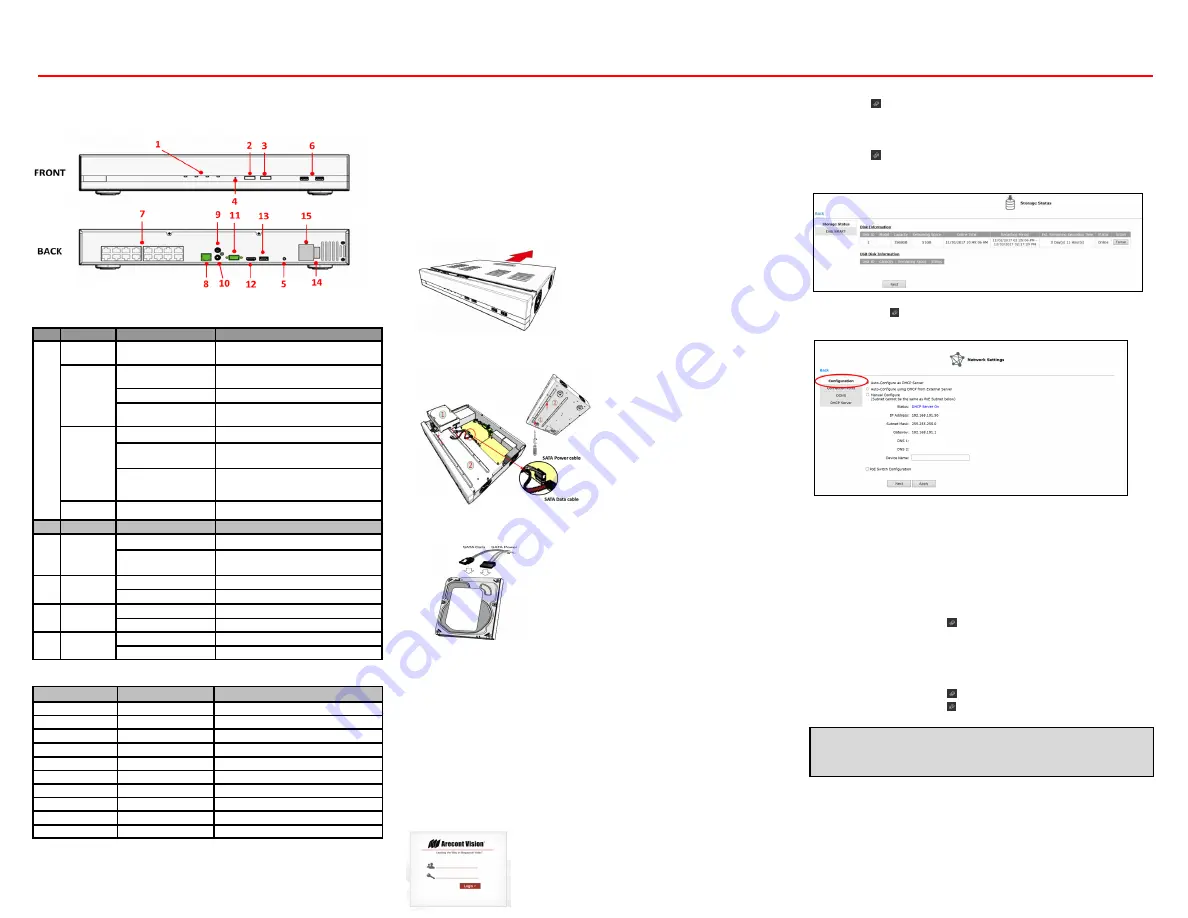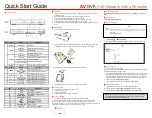
█ Hardware Overview
Quick Start Guide
AV
NVR
PoE Network Video Recorder
No.
LEDs
Status
Definitions
1
Power
Solid Light
Power on
Disk
Solid Light
HDD functioning properly
Blinking
Failed HDD
Off
No HDD/ HDD is offline
Status
Solid Light
Operating properly
Blinking
( 100ms On/Off )
Restore factory default process/
Firmware update
Continuous Blinking
(1000ms On/Off)
Failed firmware update
Alarm
Blinking
System/Camera event occurs
No.
Buttons
Status
Procedure
Mute
Stop
Press to stop a buzzer
2
Restore display
defaults
Press and hold for 5 seconds
3
Record
On
Press and hold for 1 second
Off
Press and hold for 1 second
4
Reset
Restore default
Press and hold for 10 seconds
Restart
Press and hold for 1 second
5
Power
On/ Off
Press and hold for 1 second
HW Force Off
Press and hold for 10 second
█ Preparation
1. If you would like to install HDDs or expand your HDD capacity, please refer to “HDD
installation” section.
2. Connect supplied AC power cord to the power input (#15) on the NVR
3. Connect a Cat 5e cable to the LAN 1 port (#8) on the NVR
4. Connect a monitor to the HDMI (#12) or VGA (#11) interface on the NVR.
5. Connect supplied mouse to the USB port (#6 or #13) on the NVR
6. Connect your Audio in/ out devise to the Audio In (#9) / Out (#10) interface on the AV
NVR.
█ HDD Installation
1. Unscrew the two screws from the AV NVR cover
2. Connect SATA Power cable and SATA Data cable on the AV NVR’s main board, and
install HDDs on the NVR by securely fastening the four screws on each HDD.
3. Connect SATA Power cable and SATA Data cable to the HDD.
4. Re-install the AV NVR cover and securely fasten the six screws
█ Power on the NVR
1. Plug AC power cord into 100 to 240V AC outlet.
2. Turn power switch (#15) on.
3. Click power button (#5)
4. Power indicator (#1) should show a solid light.
█ Connect to the NVR
1. Use default IP address, 192.168.101.50, to connect to the AV NVR
2. Use the default username “admin” and password “admin” to login to the AV NVR.
NOTE: It’s highly recommended that you change the password during initial setup.
NOTE: You can have 4 to 31 characters including upper and lower case letters, digits for both
User Name and Password, and only allow four symbols: “.”, “@”, “_”, “-” .
█ (If needed) Format HDD
Visit
Settings
> Storage> Storage Status
, and click
“Format”
to initialize the
HDD.
█ Set Time & Date
Visit
Settings
> Time & Date
█ Set Network Settings
1. Visit
Settings
> Network Settings
2. Select
“Auto-Configure as DHCP Server”
if you would like to enable DHCP.
█ Connect IP cameras
1. Plug cameras into PoE ports (#7)
NOTE: This product supports Smart Plug-and-Play, so cameras should be set up and
configured automatically in couple minutes.
2. SurroundVideo and MicroDome Duo cameras will take four and two channels, so
please make sure plug the next camera into the following ports. For example, if
one SurroundVideo camera plugs into Port#1, the next camera should plug into
Port#5 since the SurroundVideo camera has taken Channel#1, #2, #3, and #4.
3. ( If necessary) Visit
Settings
> Channel
4. ( If necessary) Add cameras by
“Auto Search”
or
“Manually”.
█ Recording & Scheduling
1. The default setting for all channels is Event Record at all times.
2. ( If necessary) Visit
Settings
> Recording
to update the settings
3. ( If necessary) Visit
Settings
> Scheduling
to update the settings
No.
Interfaces
Definitions
6
USB
2x USB 2.0
7
PoE
PoE network interfaces
8
Ethernet
RJ-45 10M / 100M / 1000M
9
Audio Input
1-Ch, RCA
10
Audio Output
RCA
11
VGA
VGA output connector
12
HDMI
HDMI output connector
13
USB
1x USB 3.0
14
Power Switch
Power on /off
15
Power In
100~240V AC, 50/60Hz
NOTE:
For more advanced video parameter settings, you will need
to visit the camera’s web interface. To do so you need to connect
your laptop/PC directly to the PoE ports.



















